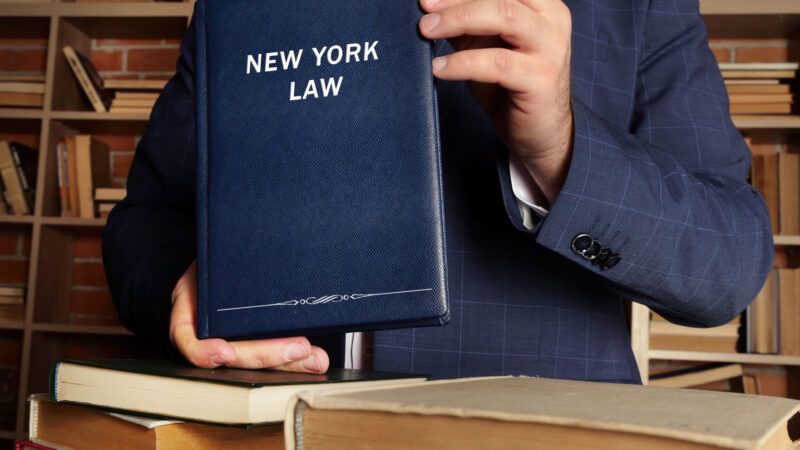New York Restricts Free Legal Advice. Now It Faces a First Amendment Lawsuit
A pastor and a nonprofit challenge occupational licensing rules.

A pastor and a nonprofit are suing the state of New York, demanding the state recognize their First Amendment right to give free advice to those fighting debt lawsuits, despite not having a license to practice law.
New York City pastor Rev. John Udo-Okon noticed many of his congregants were getting sued by debt collectors. To help, Udo-Okon teamed up with the civil rights nonprofit Upsolve. It specializes in offering personal financial guidance, such as helping people file for bankruptcy, without charge.
Udo-Okon wants to give free legal advice to assist people in contesting a debt lawsuit. But New York, like every other state, outlaws giving litigation advice without a license.
Upsolve and Udo-Okon have filed a lawsuit against New York State in the United States District Court in New York's Southern District, arguing that broad restrictions on legal advice are an infringement on freedom of speech.
"Members of my community are shut out from ways to vindicate their own rights, and are left with what feels to them like an oppressive justice system stacked against them," Udo-Okon said in a press release.
Similar First Amendment occupational licensing lawsuits have been launched in the past by the Institute for Justice (IJ), a public interest law firm. IJ Senior Attorney Robert McNamara argues that recent case law gives Upsolve's lawsuit a chance for success.
McNamara's colleagues represented Texas veterinarian Ron Hines, who fought for the right to communicate with pet owners via email. Texas law prohibits establishing client-veterinarian relationships over the phone or other electronic devices and requires in-person examinations of pets. In Hines v. Quillivan (2020), the United States Fifth District Court of Appeals ruled that Hines did not violate his veterinary in-person examination requirements and was engaging in protected speech, not veterinary conduct regulated under the law. McNamara says the Upsolve lawsuit is similar in that Udo-Okon would not practice law, only offer assistance.
According to McNamara, giving someone legal advice should be constitutionally protected speech because barring someone from speaking, especially where speaking is integral to a profession, restricts people from providing a service and others from receiving it. "Fundamentally we rely on people to decide for themselves who they want to listen to and not the government," said McNamara.
According to Marshal Coleman, a consumer attorney in New York City, a large amount of people with outstanding debt cases owe thousands of dollars, making the cost of hiring an attorney to provide guidance a problem.
"Typically, if a client like that comes to a lawyer, a lawyer's not going to be able to help them because the fees will exceed the values of the debt," Coleman told The New York Times.
According to a Pew report, at least four million Americans face consumer debt lawsuits. Only 10 percent retain lawyers, and 70 percent of cases end in default against the defendant.
The complaint notes that current state laws mean well and intend to protect people seeking legal advice from fraud, but it argues that the current rules do not hold up against First Amendment scrutiny. The lawsuit also states the plaintiffs wouldn't be charging for this advice, so there isn't the financial motivation for fraud.
Upsolve and Udo-Okon hope the Court rules that current New York laws violate their First Amendment rights. They are seeking a permanent injunction to stop the state from taking action against them, coverage of their litigation costs, and one dollar in damages for the violation of their constitutional rights.
"We believe that this is the kind of case all Americans can get behind," said Upsolve CEO Rohan Pavuluri in a press release. "We don't have equal rights under the law. What we have is equal rights if you can afford a lawyer. This is one of the fundamental and urgent injustices of our time."
